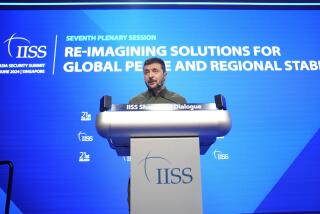Weinberger Arrives in Peking on Heels of Soviets, All Hoping for Better China Ties
- Share via
PEKING — Defense Secretary Caspar W. Weinberger arrived in Peking on Tuesday on the heels of Soviet officials who are seeking improved relations with China. At the same time, a Chinese delegation was preparing to leave for Washington and talks on military logistics.
And so, the defense secretary finds his journey here sandwiched between two sets of international meetings, each carrying symbolic significance for the triangular relationship of the United States, China and the Soviet Union.
Weinberger’s visit comes at a time when both the United States and the Soviet Union are trying to improve their relations with China. Soviet ties with China have been strained for more than two decades.
“We have a major chance with the Chinese,” a senior State Department official said, speaking on the condition that he not be identified by name.
Hopes for Port Call
According to a Pentagon source, Weinberger had hoped to announce here that a U.S. Navy vessel is to make a port call in China for the first time since the Communists took power in 1949. This port call was seen as an occasion that would call attention to the improvement in U.S.-Chinese military ties.
Weinberger was not pleased when the Chinese leaked word last month of the planned visit, the source said.
Meanwhile, the Chinese are courting U.S. participation in their fledgling space program and would like to launch U.S. commercial satellites. Weinberger is likely to be allowed a look--rare for a Westerner--at the Chinese launching site near Xichang in Sichuan province.
In the 1970s, as U.S. relations with China were being pursued after President Richard M. Nixon’s visit in 1972, the focus was almost entirely on strategic issues--the two countries saw each other in terms of their value as a counter to the Soviet Union.
Soviet Role at Issue
The Soviet Union’s role in Asia continues to be a focal point, an issue Weinberger referred to in a speech Saturday night in Anchorage, Alaska, that raised the curtain on his 19-day global tour. But a U.S. expert on Chinese affairs said Monday that “our overall relationship with China has broadened considerably.”
One matter that will be on the agenda here will be the meeting in Iceland this weekend between President Reagan and Soviet leader Mikhail S. Gorbachev, a session that was arranged well after planning for Weinberger’s trip was nearly complete.
“They are interested in what’s happening in Iceland,” Weinberger said of the Chinese leaders. “I hope to be able to answer some of their questions on that.”
He made this remark while talking with reporters on his plane shortly before arriving here.
A U.S. official who asked not to be identified by name said the Chinese “appreciate that we talk to them as a friend” about the relations of the United States and the Soviet Union.
“It shows we’ve come a very long way,” he said, “from the time we worried about the Chinese to the point that we’re talking with them about the Soviet threat. We’re able to discuss with the Chinese our differences around the world. We differ with them on a number of issues.”
Policy Differences
China differs with the United States on its support for Israel and for its “constructive engagement” policy toward South Africa, a policy intended to encourage, through diplomatic pressure, an end to apartheid. The United States differs with China on Peking’s reported sale of arms to Iran, although Weinberger said there has been positive reaction to objections raised by the Reagan Administration.
When Weinberger was last here, in 1983, he set in motion U.S. assistance for Chinese efforts to modernize their ground defenses, the electronics in their F-8 interceptor jets, and their naval torpedoes. Now China has undertaken to modernize its army, reducing personnel and trying to convert what is kept on into a more professional force.
On Thursday, Weinberger will address officers studying at China’s National Defense University, and a U.S. official said, “We think it’s very useful to get the colonels and majors interested in American military doctrine.”
Concern About Soviets
In trying to improve the Chinese military, in ways considered not threatening to U.S. interests in Asia, the United States is said to be acting out of concern about the Soviet Union.
The official said such steps are being taken to make sure that the Chinese do “not fall behind the Soviet Union” any more than at present, and do not “become more belligerent to their neighbors, out of insecurity, or accommodating to the Soviet Union.”
It is in the area of technology transfer that the shift in the U.S.-Chinese relationship has been particularly noticeable.
In 1982, according to an official traveling with Weinberger, the United States approved 2,020 licenses for U.S. firms to export to China sensitive technology valued at $580 million. By 1985, the number of licenses had increased to 8,637 and the value to $5.5 billion.
“We’ve come quite a distance,” the official said.
So, too, have the Chinese and Soviets, if the number and regularity of their talks is any reflection. The Sino-Soviet meetings that coincide with Weinberger’s visit are the ninth round since 1982, the first since Gorbachev formalized, in a speech in July, his government’s effort to improve ties with China.
China has contended that there could be no improvement in its relations with Moscow until the Soviet Union withdraws some of the troops massed on the Sino-Soviet border, halts its military activity in Afghanistan and ends its support for the Vietnamese occupation of Cambodia. Gorbachev has recently indicated greater flexibility on all three issues and announced the first withdrawal of a limited number of troops from Afghanistan.
More to Read
Sign up for Essential California
The most important California stories and recommendations in your inbox every morning.
You may occasionally receive promotional content from the Los Angeles Times.












